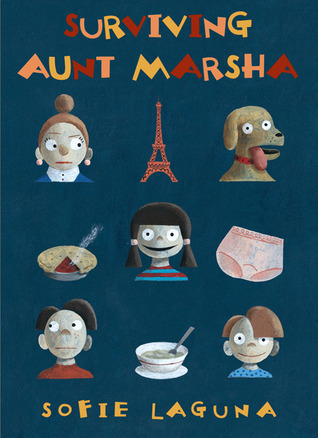
- Free Article: No
- Contents Category: Young Adult Fiction
- Review Article: Yes
- Article Title: Feeling Unsafe
- Online Only: No
- Custom Highlight Text:
The beauty of reading is that you can experience other people going outside their comfort zones with-out apparently leaving your own. This collection of novels, while varied in subject matter, genre, and age appeal, is similar in that they all present the reality of feeling unsafe in one way or another.
- Book 1 Title: Saving Francesca
- Book 1 Biblio: Penguin, $24.95 pb, 244 pp
- Book 1 Cover Small (400 x 600):

- Book 1 Cover (800 x 1200):

- Book 2 Title: The Glass Mountain
- Book 2 Biblio: UQP, $18.95 pb, 269 pp
- Book 2 Cover Small (400 x 600):

- Book 2 Cover (800 x 1200):

- Book 3 Title: Surviving Aunt Marsha
- Book 3 Biblio: Omnibus, $14.95 pb, 139 pp
- Book 3 Cover Small (400 x 600):

- Book 3 Cover (800 x 1200):

Francesca Spinelli is part of the first Year 11 intake of girls at a boys’ Catholic school. She has been forced out of her ‘complacent’ niche at St Stella’s and she’s not happy.
It’s Thursday afternoon, and we have sport. These are the choices for the girls: watching an invitation cricket game; study in one of the classrooms; or watching the senior Rugby League. As you can imagine, I’m torn. … There are thirty of us girls at Sebastian’s and I want so much not to do the teenage angst thing, but I have to tell you that I hate the life that, according to my mother, I’m not actually having.
School is not the only thing she hates about her life. Her mother is in the middle of a nervous breakdown, her family seems to be crumbling, she doesn’t know who she is and she thinks she’s falling in love with a prefect whom she loathes. Marchetta quickly establishes Francesca’s dry, ironic tone and uses it deftly to narrate the many layers and issues contained in the story. The observations about gender politics in the classroom are sharp, and the author’s inside knowledge of the way schools work is accurate. Her insights into how girls can frame and manipulate each other within friend-ship groups are wincingly accurate, and her sense of the ridiculous is delightfully unencumbered. Moreover, the frame-work of parallel journeys established for the characters works, without seeming too obvious. It has been ten years since Looking for Alibrandi, but I don’t mind waiting for quality.
Nom in The Glass Mountain is no less angst-ridden about his life; he’s had a tougher start than most. We meet him at the point when, like his father seven years before, he has just attempted suicide on a motorbike. At his father’s funeral, the president of the ‘Big Man’s’ bikie gang tells him, ‘one day ya’ll be a Pit Viper’, but, as we get to know more about Nom and the events leading up to his suicide attempt, it becomes apparent that he is running hard – from the grief over his father’s death and from a world to which he doesn’t want to belong.
The book opens with a description of the ‘Big Man’s’ funeral. Walters’s powerful writing delivers a sturdy combi-nation of the poetic and the everyday.
This machine has handlebars and headlights for burning the heavens, chrome daggers for slicing stars. And no front fenders to stop the wind.
The bikes swerve right, left again, then gear down to take the hill. From the back the young bikie watches the formation rise like black migratory birds, predacious and hungry. Before their eyes mirages form, upon their flesh the north wind sears and the falling sun digs deeper.
The plot is a familiar one: two very different people – one young no-hoper and one feisty pensioner – thrown together by fate who, in spite of themselves, build a strong friendship. Breaking it down to those elements, it sounds clichéd, but Walters peoples her story with believable characters and well-drawn spheres of existence, creating a satisfying mix of the predictable and unpredictable.
We really feel for Ossie, as Nom comes to be known, and we hope that Walters’s prediction that ‘No matter how fast or how long the sail of the windmill turns, it returns to where it began’ will be proven wrong. Walters uses quotes from Kenneth Grahame’s The Wind in the Willows to preface each of the book’s four parts. At first, I found this a little obtrusive, but, towards the end, that story had almost become another character, providing comfort to both Ossie and Essie, the pensioner. And if you read Walters’s whole story against the backdrop of the traditional Irish folk tale printed at the front of the book, you will appreciate the deeper themes that run through it.
The situations presented in Surviving Aunt Marsha and The Black House are almost opposites, but both are concerned with homesickness in one form or another. When Aunt Marsha comes to stay, Tina, Vince and Aidan are desperately trying to keep homesickness at bay in their own home. Their parents have gone to Paris for three weeks to renew their vows and ‘bring back the romance’ to their relationship – which, one suspects, is suffering from the strain of these very individual children. Bossy Aunt Marsha is the aunt from hell who cooks nothing but cabbage and kidney pie, insists on the punctual completion of homework and bans Mandy, the family dog, from coming inside.
Written for younger readers, with many amusing asides for adults, the first-person narrative flattens the story so that, at times, Tina’s descriptions became rather lifeless and matter-of-fact. It reminded me that the first person is an overused device, and that it is hard to make this voice fade into the background. That said, Sofie Laguna is to be congratulated for capturing that awful feeling of ‘just wanting home’, and when the inevitable transition from hating to liking Aunt Marsha arrives, not only was I convinced, but I was left wanting a sequel.
Barney, on the other hand is trying to make the most of living in an isolated science facility, ‘The Black House’ of the title, which has become home so that his father can take up a position researching communication with octopuses. The lime-green, electric blue and black cover, and the window that watches like some sinister eye, scream alien invasion. Jackie French is a master storyteller who knows well how to engross her audiences. Her narration allows you the intimacy of a personal account, while suggesting the threat of a grander plan at work. Barney does eventually discover the mystery behind the walls that leak slime and the house that seems to sigh, but, thankfully, French refrains from making the care-taker, Mr Owens, the corrupt and evil adult often present in such books. In her inimitable style, French manages to slip in a political message about communicating with aliens, which should take any adult reader out past their own xenophobic comfort zones – even if the children miss it – and gives the book’s ending a complete twist.
NIPS Go National took me out past my comfort zone, as I know little about any Australian sports. I enjoyed it a lot more than NIPS XI, and it confirmed what I already knew: laughter is one of the best ways of getting people to try new things. Lan and his Asian-Australian cricket team, the NIPS (from North Illaba Primary School, before you complain about racist slurs), have been invited to play in a Harmony Cup cricket competition in Melbourne that will bring together multicultural teams from around Australia. Spinner McGinty, the NIPS’s coach, inadvertently gives Lan the idea of keeping a captain’s diary:
Every cricketer and his dog writes a book these days – or gets some scribe to write a book for him, more like. Captains write diaries and tour logs, umpires write their memoirs. Sometimes I think every bloke on the pitch is scribblin’ away. Beats me how anyone has time to play cricket.
Ruth Starke uses Spinner to make lots of witty digs at sport, and Lan’s diary is a subtle device to draw out the life lessons that can be learnt from sport, and to explain things that the reader may not know about cricket. There is a mysterious secret about Sam, the new team member, but even if you do spot it early on, you will be held to the last wondering how Lan will deal with the predicament they are in. My venture with Starke into a new zone enabled me to engage with cricket in a way no other medium has.


Comments powered by CComment